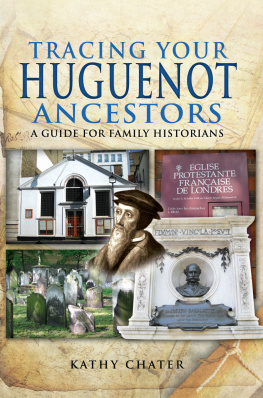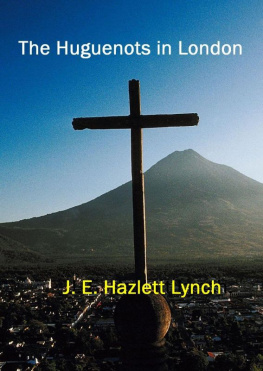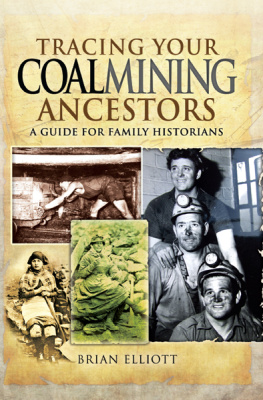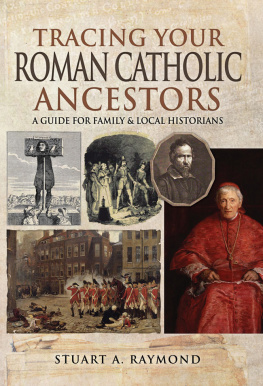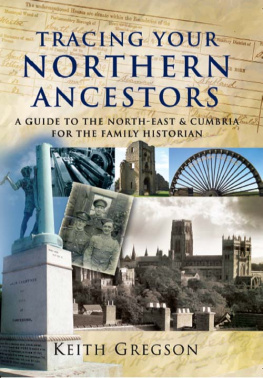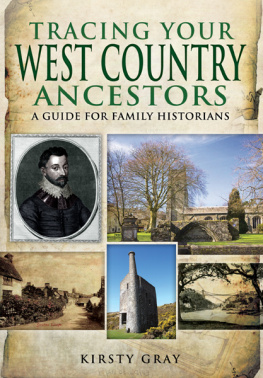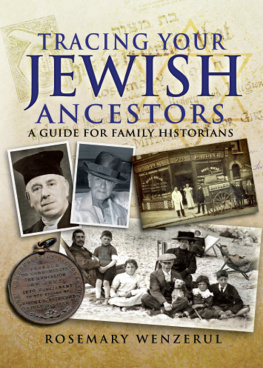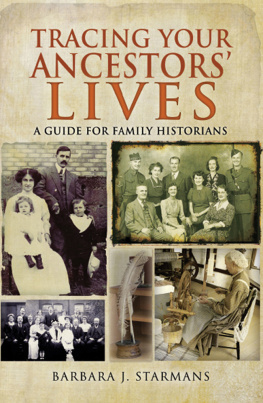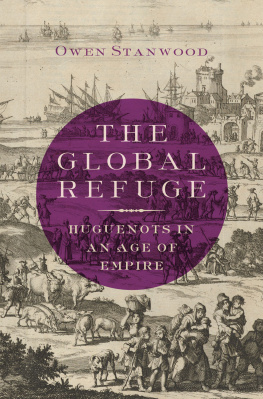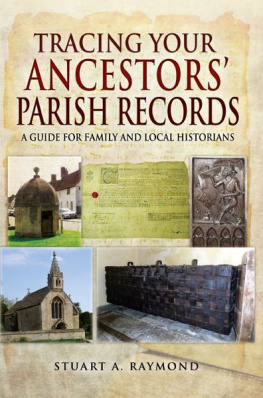
FAMILY HISTORY FROM PEN & SWORD
Tracing Your Channel Islands Ancestors
Marie-Louise Backhurst
Tracing Your Yorkshire Ancestors
Rachel Bellerby
Tracing Your Royal Marine Ancestors
Richard Brooks and Matthew Little
Tracing Your Pauper Ancestors
Robert Burlison
Tracing Your Labour Movement Ancestors
Mark Crail
Tracing Your Army Ancestors
Simon Fowler
A Guide to Military History on the Internet
Simon Fowler
Tracing Your Northern Ancestors
Keith Gregson
Your Irish Ancestors
Ian Maxwell
Tracing Your Scottish Ancestors
Ian Maxwell
Tracing Your London Ancestors
Jonathan Oates
Tracing Your Tank Ancestors
Janice Tait and David Fletcher
Tracing Your Air Force Ancestors
Phil Tomaselli
Tracing Your Secret Service Ancestors
Phil Tomaselli
Tracing Your Criminal Ancestors
Stephen Wade
Tracing Your Police Ancestors
Stephen Wade
Tracing Your Jewish Ancestors
Rosemary Wenzerul
Fishing and Fishermen
Martin Wilcox
Tracing Your Canal Ancestors
Sue Wilkes

First published in Great Britain in 2012 by
PEN & SWORD FAMILY HISTORY
an imprint of
Pen & Sword Books Ltd
47 Church Street
Barnsley
South Yorkshire
S70 2AS
Copyright Kathy Chater 2012
ISBN 978 1 84884 610 4
ebook ISBN 978 1 84468 407 6
The right of Kathy Chater to be identified as Author of this Work has been asserted by her in accordance with the Copyright, Designs and Patents Act 1988.
A CIP catalogue record for this book is available from the British Library.
All rights reserved. No part of this book may be reproduced or transmitted in any form or by any means, electronic or mechanical including photocopying, recording or by any information storage and retrieval system, without permission from the Publisher in writing.
Typeset in Palatino and Optima by
Phoenix Typesetting, Auldgirth, Dumfriesshire
Printed and bound in England by
CPI UK
Pen & Sword Books Ltd incorporates the imprints of
Pen & Sword Aviation, Pen & Sword Family History, Pen & Sword Maritime, Pen & Sword Military, Pen & Sword Discovery, Wharncliffe Local History, Wharncliffe True Crime, Wharncliffe Transport, Pen & Sword Select, Pen & Sword Military Classics, Leo Cooper, The Praetorian Press, Remember When, Seaforth Publishing and Frontline Publishing
For a complete list of Pen & Sword titles please contact
PEN & SWORD BOOKS LIMITED
47 Church Street, Barnsley, South Yorkshire, S70 2AS, England
E-mail: enquiries@pen-and-sword.co.uk
Website: www.pen-and-sword.co.uk
CONTENTS
I n todays secular society it is difficult to understand the crucial role that religion played in the past in Europe. For centuries wars were fought which resulted in regions changing rulers, each imposing different religious orthodoxies on the inhabitants. This resulted in massive migrations of people, both within Europe and across the Atlantic to the Americas, because their beliefs mattered so much to them. Between the sixteenth and eighteenth centuries, the biggest group of what would today be called asylum seekers were Protestants, generally known as Huguenots.
The derivation of the term Huguenot is not really known, although it may be from the German Eidgenossen (confederates bound together by oath), used between 1520 and 1524 for the people of Geneva in Switzerland who opposed the Duke of Savoy. One of their leaders was called Besanon Hugues and this may have influenced the name. Another possibility is that the term is derived from the French Huguon meaning one who walks by night: Protestants in Catholic countries had to conceal themselves from the authorities and took to holding services at night in isolated places.
Strictly speaking, Huguenots are those who fled from France in the time of Louis XIV (reigned 16431715) because of religious persecution. The Huguenot Society decided at the outset to include in its remit earlier Protestant refugees who had left the Low Countries and France in the sixteenth century. The Low Countries consisted of present-day Netherlands; Flanders, a region now in Northern France but then in the Spanish-ruled Netherlands; present-day Belgium and Luxembourg. The southern part of this area was inhabited by French-speakers, called Walloons, and those from the northern part were Dutch-speaking. I have decided to include all three groups Dutch, Walloons and Huguenots - in this work, partly because they have their religion in common and partly because they are all often referred to as Huguenots.
Before 1752, the new year began on 25 March so dates between 1 January and 24 March are usually written 2 January 1700/1 or whatever to avoid confusion between the practice then and now. However in Scotland and mainland Europe, the change had generally taken place in 1600 so family historians need to be aware of this when doing research.
The Huguenot Society
The Huguenot Society of London was founded in 1885 to promote the publication and interchange of knowledge about Huguenots in the United Kingdom. It is not limited to those with Huguenot ancestry, but is also open to those who are interested in the subject. In 1986 it became the Huguenot Society of Great Britain and Ireland to reflect the breadth of interests among the Societys membership. As well as holding four meetings a year in London, where a paper on an aspect of Huguenot history is given, the Society arranges occasional visits to places of interest in the United Kingdom and overseas. There have also been conferences, such as From Strangers to Citizens, held in 2000 to commemorate the 450th anniversary of Edward VIs charter allowing strangers to set up their own churches. The Society also has an extensive programme of publishing: as well as the Proceedings of the Huguenot Society, containing articles and book reviews, there is the Huguenot Society Quarto Series (HSQS), volumes of transcriptions of church registers and associated documents, like the archives of the French Hospital, and editions of historic works such as a contemporary account of the religious war in the Cvennes region of France by Abraham and Elie Marion. The new series has reprints of autobiographies of various refugees and academic studies of particular topics, like the history of the French Church in Southampton. The Societys publications, listed in the Bibliography, and its Library are the primary sources of information about Huguenots in Britain.
The Irish Section of the Society was set up in 1986. It holds an annual service at St Patricks Cathedral in Dublin each November, and also arranges lectures and visits.
Acknowledgements
I have drawn heavily from articles in the Proceedings of the Huguenot Society and the Huguenot Societys other published works, especially the registers of the various churches, which usually give a detailed account of the churchs history. Together these sources contain a formidable body of expertise. The various writers are too numerous to list but I am in grateful awe of their knowledge and scholarship, which I have necessarily had to abridge for this publication. Researchers should follow up the various works listed in the Bibliography. I would also like to thank Lucy Gwynn, the Librarian of the Huguenot Library, for her unstinting help and for generously sharing her extensive knowledge of the archives.
Next page
